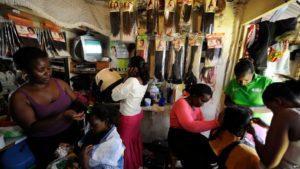
“So, you will take my hair for 1,500 Ksh (USD $15) with the cut?” I asked, almost unsure if this is a real deal.
“Yes, but are you sure you want to do this?” Jayne asked again.
“Oh yes, just make sure I get great cut please!” I responded.
Never did I imagine I could get a free hair-cut whilst gaining a small sum of pocket money by “offering” my 30-inch black hair to a hair stylist in Nairobi.
If I asked you to make a list of the top ten lucrative industries in Africa, I’m sure human hair would never cross your mind. Yet, this is the reality – dry hair market (the market for weaves, wigs and hair extensions) is a multi-billion-dollar industry in Africa. Whilst this is the continent where great population live below the poverty line, the beauty industry, especially hair products, is experiencing a significant boom. Certain studies demonstrate that African women are willing to spend more than double the amount on hair and beauty products than Caucasian women.
Although hair culture and styling may differ across countries, unquestionably African women change their hairstyle more frequently than any other continent. Anyone who has lived on this continent will notice that one may never use a hair-style to recognise an African woman because their styling literally changes every week! “African women are probably the most daring when it comes to hair styles,” says the director of L’Oreal in South Africa. Don’t ever think that hair styling comes by easily, not only is hair braiding an expensive exercise, it is also very painful and time-consuming. Sleeping on the night which braiding is done can be difficult and headache can last up to two days.
Until I arrived on the African continent, my Asian black hair never occurred to me to be a valuable asset. No doubt, “Brazilian”, “Peruvian” and “Malaysian” human hair are the common ethnic lines you hear about on the African market. Yet, in reality, the largest global human hair export players are India and China. For religious reasons, most of the virgin human hair are sourced from India from rural temples and villages with female Hindu pilgrims. China also makes up a significant supply pool of human hair for the global market, but generally sold for money-driven reasons. In order to drive cost down, even goat hair is mixed into human hair during processing.
Whilst African women may or may not know where their human hair extension actually comes from, it is certain that human hair extensions will continue to experience an explosive growth in Africa.